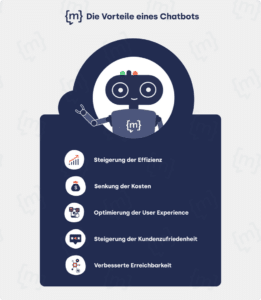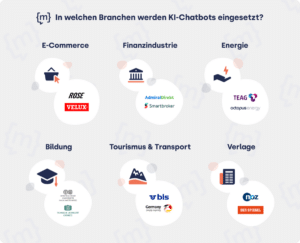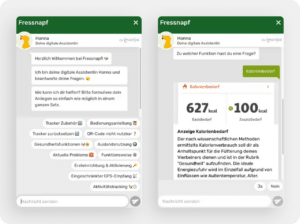AI in customer communication
Reasons why an AI chatbot should be integrated into customer communication
– successful examples from practice
AI chatbots are on the rise – but what’s behind the “AI”?
An AI chatbot is an application that uses artificial intelligence (AI) to converse with humans in natural language. Users can ask questions in a chat window on a website or app, to which the dialog system responds automatically in natural language. Depending on the chatbot, this can be text input, audio input, or both. AI-driven chatbots were originally developed for customer service, but are now used as versatile business and marketing tools. For the past few years, chatbots have been gaining momentum due to the advancement of technology and the increasing prevalence and demand of automation and artificial intelligence. This is because, thanks to AI, a chatbot is able to recognize the user’s intent and the content of the question, thereby learning from existing conversations. This makes it possible to make connections between multiple pieces of information, respond to unexpected questions, and consequently engage in more complex dialogues. The most recent and probably best-known development in the field of intelligent dialog systems is ChatGPT, which is currently in the media spotlight around the topic of AI. ChatGPT uses a neural network that has been trained on the basis of a huge amount of data to be able to conduct human-like conversations. These conversations can be simple or complex, as ChatGPT can access knowledge from multiple sources, including information gathered during previous conversations. The growth and usage of this technology are increasing exponentially and ChatGPT attracted 100 million users in just a short period of time.
Why is an AI chatbot so relevant right now?
As digitization increases, AI chatbots offer a great way to future-proof businesses and automate processes in a cost- and time-saving manner. When AI chatbots are integrated into customer service systems, seamless linking with other systems such as CRM software or logistics software is possible. In this way, it is possible to provide individualized and personalized information and answers without the need for human intervention. The integration of AI chatbots helps companies to support customers 24/7 and at the same time relieve employees. For example, digital assistants can handle a wide range of tasks – from simple inquiries and routine tasks to complex concerns and transactions. In addition, AI chatbots can provide personalized support by responding to specific user information and preferences. Consequently, they bring many advantages to deal with continuous availability, cost reduction, automated advice, improvement of customer satisfaction, or even brand communication – to list just a few of the benefits.
Image source: moinAI
Insights of the AI chatbot provider moinAI
Founded in 2015, moinAI has been specializing in the development of AI chatbots for digital customer communication for companies for several years now. moinAI relies on the latest artificial intelligence technologies to develop chatbots that can conduct human-like conversations and answer complex questions – no matter if in marketing, sales, or customer service. Depending on the use case, this results in benefits such as increased customer satisfaction, more automated leads, an increased conversion rate, and a reduction in support volume. moinAI’s chatbots can be integrated on various platforms such as Facebook Messenger, WhatsApp, and Telegram – but the focus is on the use of chatbots on websites. At the same time, the use of moinAI is not limited to a few industries: Almost any industry that deals with recurring questions and automation potential can ideally use a chatbot. With moinAI, over 100 companies from diverse industries have been able to optimize their customer communications. These include Flatex, Fressnapf, and DER SPIEGEL, among others. The range of use cases runs from first-level support to marketing campaigns to e-commerce strategies and many more.
Self-learning chatbot
The special feature of moinAI is the capability of self-learning / self-learning t. The so-called self-learning works by means of several AI principles and ensures that moinAI is a kind of self-runner. Once the AI chatbot has been trained and implemented in the respective company, no further, cost-intensive training or AI training is required, as the AI continues to develop on its own (under the observation of moinAI’s AI and data science team, of course). In addition, the language understanding is Natural-Language-Processing-based (NLP-based), which means that the AI does not understand user queries based on keywords, but recognizes semantic relationships. Through NLP and AI, moinAI thus understands even complex messages and learns independently with each user conversation. Thus, moinAI offers a system that grows with the needs and requirements of the company.
The importance of AI chatbots in customer communication.
Customer communication is elementary for companies, as it helps maintain customer relationships and build long-term customer loyalty. Given the increasing demand for world-class service, AI chatbots can play an important role in improving customer communication.
Artificial intelligence in customer communication usually works as follows:
- The chatbot uses natural language processing (NLP) technology to understand text input from users
- Machine learning and algorithms are used to select and return an appropriate response for the user
- If the chatbot cannot answer a query, it is forwarded to a human employee to handle it
- By automating standard requests, human employees can focus on complex requests.
- In this way, customer satisfaction is increased, which contributes to long-term customer loyalty
Customers appreciate a quick and uncomplicated way to get in touch. In this context, AI chatbots can make a valuable contribution by responding immediately to queries and providing quick answers. Since chatbots work automatically and require no human intervention, they are available at all times. This is especially important as requests are often made outside of regular business hours. In addition, customers expect personalized communication tailored to their individual needs and interests. Again, AI chatbots can help by providing personalized recommendations based on data analytics or by drawing on previous customer interactions to better understand the context of the current request. Therefore, AI chatbots are a valuable support for companies to better serve their customers while streamlining internal processes.
For which application areas are AI chatbots suitable?
AI chatbots are a valuable way to future-proof businesses in a variety of industries. They are highly mutable and adaptable, which is why they can be used in almost any industry. They are always suitable where questions need to be asked and answered. Some popular examples where AI chatbots can be particularly effective include customer service, e-commerce, finance, energy, manufacturing, education, publishing, tourism, and transportation.
Image source: moinAI
Learn more about the benefits AI chatbots bring to these same industries below:
- In e-commerce, AI chatbots can convert website visitors into paying customers by enhancing their shopping experience and helping them navigate online stores. By providing tailored product suggestions, order updates, and assistance with processing returns, AI chatbots can increase customer satisfaction and provide scalable services, even during seasonal peaks or periods of growth.
- In finance, AI chatbots can help keep customer care quality high and provide top-notch service at competitive rates. Also, real-time support, meaning customers can get help quickly at any time, which sets companies apart from their competitors.
In tourism, AI chatbots enable round-the-clock global service and flexible adaptation to customers’ needs through multilingualism and automatic provision of up-to-date information. By using multiple channels, customers can be served across different platforms. - In the energy sector, AI chatbots can provide easy self-service options and reduce the burden on support staff by providing automated and quick answers to standard questions such as budget billing.
- In educational institutions, AI chatbots offer modern and innovative communication channels and can provide a multilingual point of contact for international students, for example. Automating processes can generate more applications and create accessible contact options for students and prospective students.
- In industry, AI chatbots can serve as a universal channel for all audiences, provide answers for B2B, B2C, or B2B2C, and generate leads by embedding forms in the chatbot. By pre-qualifying contacts, navigation and qualification through the chatbot can be automated to answer recurring questions from end customers.
- In publishing, AI chatbots help avoid paywall bounces by converting visitors into paying customers and making customer service in the subscription store more efficient. Automating recurring questions can ensure the chatbot’s editorial design and save resources.
Successful real-world examples (real-world examples).
There are various examples that illustrate how companies are effectively using AI chatbots in their business operations. In the following, the examples of the companies Fressnapf, DER SPIEGEL, and Flatex are presented in order to get an insight into which advantages the AI chatbot brings to the respective company and the suitable industry.
Image source: moinAI
DER SPIEGEL
DER SPIEGEL also uses an AI chatbot on its subscription pages, which automatically answers 80% of the service queries received in the chat. A subscription store in particular is often confronted with high bounce rates, whereby an intelligent chatbot can counteract this. With its 24/7 service, the self-learning chatbot is available to potential customers on the Spiegel subscription page and always answers questions about various subscriptions in real-time. The digital assistant handles all types of inquiries, regardless of whether they are repetitive. In addition to the high automation rate, the chatbot has increased subscription revenue and achieved a CSAT of 75%. With these impressive results, DER SPIEGEL thus represents a successful example of the use of AI chatbots in the publishing industry.
Flatex
Last but not least, Flatex shows how an AI chatbot can be successfully used in finance. By implementing an AI chatbot, the company has managed to reduce the burden on customer service, even in the face of strong growth. The volume and variability of inquiries were reduced, while conversion rates were increased. This best-practice example shows that it is possible to implement an AI chatbot quickly, even with a small effort, and achieve maximum impact on new customer acquisition and support relief.
Conclusion: outlook for the future.
The future outlook for AI chatbots is promising, especially as they become more intelligent, self-learning, and able to respond to individual customer needs. Customers love chats because they are instantly available and match their communication habits. More and more companies are focusing on automation and the use of artificial intelligence in customer service and support processes as well as in marketing and sales. The possibilities are broad and AI chatbots will continue to take on more and more tasks in the future. Whereby they are already capable of taking on complex tasks. However, it is also important to note that human interaction will continue to be irreplaceable. There will always be cases where human intervention is required – whether for highly complex concerns or in emotional situations. An AI chatbot should be viewed as a complement to, not a replacement for, human assistance. Overall, the future with AI chatbots will improve the efficiency and quality of in a variety of areas and processes and provide an easy and user-friendly experience for customers as well as employees.
Sources
https://www.tagesschau.de/wirtschaft/technologie/chatgpt-wachstum-bezahlangebot-abo-101.html
https://www.moin.ai/webinar/selbstlernender-ai-chatbot-e-commerce


